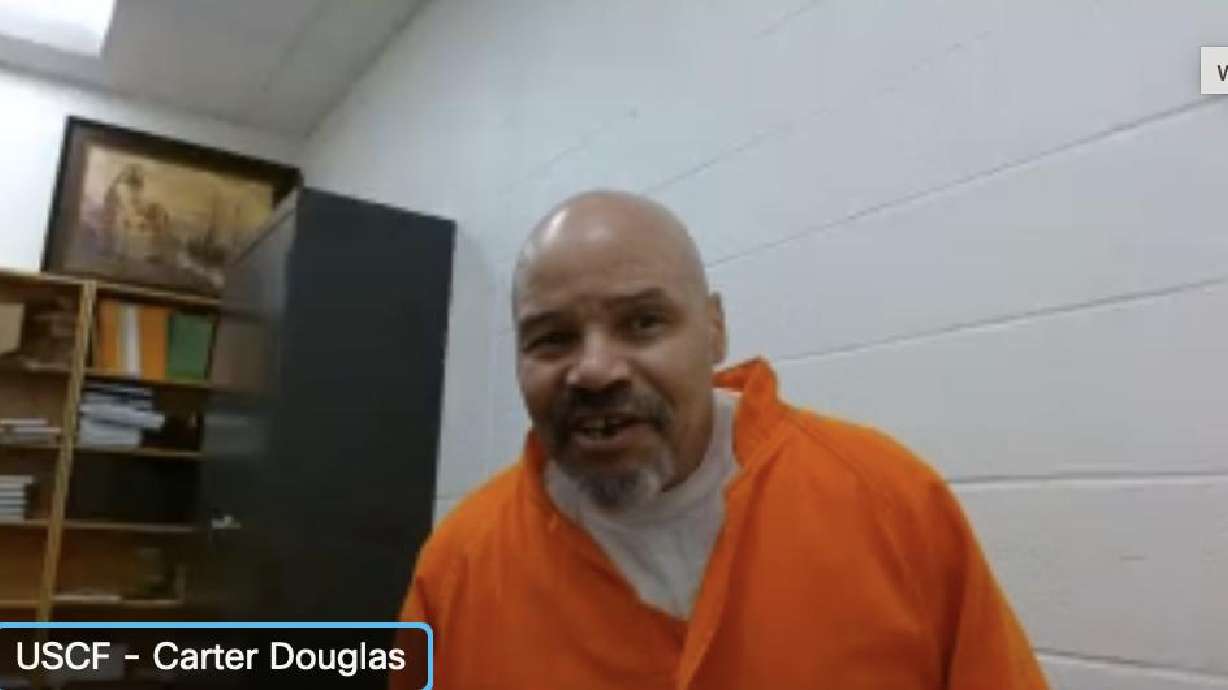Estimated read time: 3-4 minutes
- Douglas Carter's new trial process begins after Utah Supreme Court's said constitutional violations merit a second trial.
- Judge Derek Pullan said he would appoint two attorneys to represent him if they reach a contract with the county and show they are certified.
- Carter is charged with the murder of Eva Olesen. He was convicted in 1985 but is now presumed innocent again.
PROVO — Utah's 4th District Court is now holding hearings to move toward a second jury trial for former death-row inmate Douglas Carter after a Utah Supreme Court order last month.
Carter was found guilty of aggravated murder, a capital offense, by a jury on Dec. 19, 1985. But the Utah Supreme Court ruled in May that there were serious constitutional violations in his previous trial, meriting a second jury trial — affirming a district court decision.
In a hearing on June 3, 4th District Judge Derek Pullan determined Carter qualified for a public defender and scheduled the hearing on Tuesday to address who would represent him.
Recently, the Utah County Public Defender's Office stated that it was not equipped to handle a separate death penalty case due to a lack of certified attorneys. In this instance, it also suggested consulting attorneys outside the office.
Richard Gale attended Tuesday's hearing and said he and Neal Hamilton need a few more weeks to finalize contracts with Utah County, allowing them to represent Carter as public defenders paid by the county.
Pullan said in Tuesday's hearing that if an appropriate contract is reached with the county, and Gale and Hamilton show they are certified for the death penalty case, he will appoint them. Pullan was assigned to Carter's case over a decade ago and ruled in 2021 in favor of a new trial and sentencing — the ruling the high court affirmed.
Next steps
Gale said once he is appointed, he will need to get information about the case from prosecutors and meet with Carter.
In response to Gale's comments that he would visit Carter, Carter responded: "How long (is) that going to be, because, you see, I'm wondering what I'm being charged with."
Deputy Utah County attorney Erwin Petilos said there are eight boxes of discovery prosecutors are still going through in the case.
"It's going to be a work in progress, but we'll move as expeditiously as possible," he said.
He said he plans to file a motion to move Carter from the prison to the Utah County Jail in the next 24 hours.
Carter voiced that he has a lot of court documents in his room at the prison, and if he were to move to the jail, he would rather not have a roommate in his cell so he can maintain access to those.
Pullan asked Carter and his attorneys to address that request in a written response to Petilos' motion to transfer him.
The next hearing in the case was scheduled for June 24, after Gale expressed a desire to keep the case moving forward.
Case background
Carter, now presumed to be innocent again, will face trial on an aggravated murder charge in the death of Eva Olesen.
Olesen's husband found her body in her home in Provo on Feb. 27, 1985. She had her hands tied behind her back and her clothing removed from the waist down. She had been stabbed 10 times and shot in the back of the head.
Carter was a suspect because he was identified by a witness in a nearby vehicle trespass offense, and his wife rushed home after hearing about the murder to see if he was involved, according to court documents. He signed a written confession admitting to the killing after his arrest, the recent Utah Supreme Court order said.
In the order, the judges said no physical evidence tied him to the crime scene. They said two witnesses whose testimonies corroborated portions of his confession were being paid by prosecutors, and Carter's attorneys were not informed. They also reported years after his sentence that they were pressured to lie about the financial support and testify about a fabricated statement.
"There is no question that these numerous constitutional violations — suppressing evidence, suborning perjury and knowingly failing to correct false testimony — prejudiced Carter at both his trial and sentencing," the high court said.









